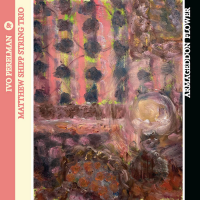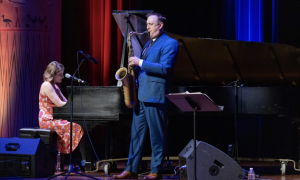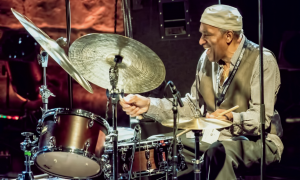Home » Jazz Articles » Catching Up With » Jorge Luis Pacheco: Where In The World Is Pacheco?
Jorge Luis Pacheco: Where In The World Is Pacheco?


Wynton Marsalis
trumpetb.1961
Pacheco has also shared the stage with many great musicians, ranging from members of

Buena Vista Social Club
band / ensemble / orchestra
Stanley Clarke
bassb.1951

Chucho Valdes
pianob.1941
All About Jazz: You've been hailed as the "flying hands" of a new generation of jazz. Your artistry has resulted in recent invitations to guest with major American jazz musicians. What is it like to cross cultural boundaries and work with these musicians?
Jose Luis Pacheco: I like to play different music with different types of musicians. This is one of the best parts of playing jazz so, when I play in different countries, my music is different. It changes the way I play, though I'm still playing the same style. This is what happened when I worked with American musicians. We have a similar connection in many ways, sharing the same energy and playing with our hearts. We had the opportunity to create music together, which is the most important thing.
AAJ What was it like when you played with the Jazz at Lincoln Center Orchestra?
JLP American jazz musicians think more intellectually than Cubans. They tend to be a little remote. Cuban musicians often play faster and fierier; perhaps it's the climate. The roots of jazz in the world are from the Americans. Their feeling is not cold, but [it is] more premeditated. When Wynton Marsalis was in Cuba, he recommended listening more and playing less. In Cuba, we don't have a jazz school. Our school is from the streets, so we don't have this type of information. We often play fast and hard but we have to sometimes play less. To maybe play just two notes but make them really tasteful, 'cause in Latin jazz we can play too many notes.
I like to play fast and am influenced by musicians like Chucho ValdЁҰs, Emiliano Salvador, Ruben Gonzales,

Bebo Valdes
piano1918 - 2013

Gonzalo Rubalcaba
pianob.1963
Playing with Wynton and the other musicians was one of the most important experiences in my life. Everyone in Cuba respects him. I learned so much, as did the other Cuban musicians. When he emphasized to play subtly, to leave more room so you can go places, it was very important.
AAJ:What's the jazz scene like in Cuba?
JLP: Because we learn on the street, we are creating it. The new generation is trying to make new jazz. We're breaking away from the traditional, incorporating different influences. It's Cuban jazz, not Latin jazz. I like the combination of Cuban, Afro-Cuban and American music. I was in New Orleans and, in two days, learned so much from the culture and had the opportunity to play with musicians like [drummer]

Herlin Riley
drumsb.1957
AAJ: How old were you when you started to play, why did you begin and who influenced you?
JLP: I started at the age of six. I had a piano in my house because my father was a well-respected opera singer and my mother a musical director for one of the most important choruses in Cuba. I followed the steps of my older sister 'cause when I saw her play piano I said, "Hey, I want to do that too." I also studied percussion later. I loved [pianist]

Keith Jarrett
pianob.1945
AAJ: How did Chucho ValdЁҰs find out about you and what was it like working with him?
JLP: Chucho's son was my friend. My father was also a director of music television and Chucho and my father knew one another for many years from that. Chucho gave me a jazz CD for my eighth birthday, and when I heard it I said, "I want to do this." I'd visit his house and could hear him play from the living room. His son would say, "Come on, let's play basketball," but I'd have to tell him, "Wait minute," 'cause I'd have to stop and listen.
Chucho's a wonderful pianist and when I visited we'd play together. Sometimes he'd just speak to me about music but he never tried to change my style. "I'd ask him, "What do you think?" Sometimes he'd say, "Oh yes, good," and at times, "Don't play." So when I was older I told Chucho I wanted to make a CD and we did. Joaquin Betancourt who is a master arranger and producer, co-produced the CD. He gave me technical direction where Chucho gave me his artistic opinion. On one song I played for 15 minutes, which for a CD is very long, and Chucho said, "Hey you can't do that!"
AAJ: How would you describe your style?
JLP: I have a Cuban style, of course, but I have influences from musicians in other Latin countries so I consolidate. I incorporate many octaves and love to make beautiful melodies.
AAJ: You said, during a New York performance, "My English is not good, but I hope you know what happened here." What were you hoping happened?
JLP: I was hoping that the audience was feeling what I felt. I wanted to transmit my emotion from my music to the people. Some people have said, "You made me cry," and I'd say, "Great," 'cause that's beautiful. That the best present you can give to the audience.
AAJ: When I saw you perform you had a lot of variety. There was a rendition of "Besa Me Mucho," a rap tune in Spanish, a haunting composition from a documentary and so many others. Can you elaborate on your musical choices?
JLP: Well, my rap lyrics are an improvisation so they change every time. The piece for the documentary Breaking Silence (2010) is about the Black Cubans in 1912 wanting independence. The Cuban military intervened, hunting them down like animals. They were completely defenseless and, in one week, they killed three thousand Black people. It's a very sad history. About the other songs, I love to sing and play inside my piano, too, like an extension of myself.
AAJ: What do you want for your future?
JLP: I want to become a more knowledgeable musician. The world is a very fast place now and often you need to play for the money but I want other things to fill my heart. I want to go as far as I can with the music so people will recognize me as a versatile artist. I'd like to sing more with the piano too.
AAJ: Will you move to New York?
JLP: I love Cuba and my family is there. New York is different and I love it there, too. I have two T-shirts. One that says, "I love Cuba," and the other, "I love NY." I'll wear both T-shirts and take the best of both worlds. Other places, too. To play music is to be transported into another dimension and to play music is to transport myself into a state of grace.
Selected Discography
Jorge Luis Pacheco, Pacheco's Blues (Colibri, 2012)
Tags
Jorge Luis Pacheco
Catching Up With
Melanie Futorian
United States
New York
New York City
wynton marsalis
The Buena Vista Social Club
Stanley Clarke
Chucho Valdes
Bebo Valdes
Gonzalo Rubalcaba
Herlin Riley
Keith Jarrett
Comments
PREVIOUS / NEXT
Jorge Luis Pacheco Concerts
Sep
21
Sun
Jorge Luis Pacheco - Jazz Piano Masters Series
Piedmont Piano CompanyOakland, CA
Oct
11
Sat

Jorge Luis Pacheco
Harold Prince TheatrePhiladelphia, PA
Oct
23
Thu

Jorge Luis Pacheco Trio
Ronnie Scott'sLondon, UK
Support All About Jazz
 All About Jazz has been a pillar of jazz since 1995, championing it as an art form and, more importantly, supporting the musicians who make it. Our enduring commitment has made "AAJ" one of the most culturally important websites of its kind, read by hundreds of thousands of fans, musicians and industry figures every month.
All About Jazz has been a pillar of jazz since 1995, championing it as an art form and, more importantly, supporting the musicians who make it. Our enduring commitment has made "AAJ" one of the most culturally important websites of its kind, read by hundreds of thousands of fans, musicians and industry figures every month.
Go Ad Free!
To maintain our platform while developing new means to foster jazz discovery and connectivity, we need your help. You can become a sustaining member for as little as $20 and in return, we'll immediately hide those pesky ads plus provide access to future articles for a full year. This winning combination vastly improves your AAJ experience and allow us to vigorously build on the pioneering work we first started in 1995. So enjoy an ad-free AAJ experience and help us remain a positive beacon for jazz by making a donation today.

New York City
Concert Guide | Venue Guide | Local Businesses
| More...








 Buy Now
Buy Now




















